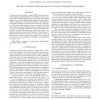Free Online Productivity Tools
i2Speak
i2Symbol
i2OCR
iTex2Img
iWeb2Print
iWeb2Shot
i2Type
iPdf2Split
iPdf2Merge
i2Bopomofo
i2Arabic
i2Style
i2Image
i2PDF
iLatex2Rtf
Sci2ools
ICASSP
2011
IEEE
2011
IEEE
Vocal attractiveness of statistical speech synthesisers
Our previous analysis of speaker-adaptive HMM-based speech synthesis methods suggested that there are two possible reasons why average voices can obtain higher subjective scores than any individual adapted voice: 1) model adaptation degrades speech quality proportionally to the distance ‘moved’ by the transforms, and 2) psychoacoustic effects relating to the attractiveness of the voice. This paper is a follow-on from that analysis and aims to separate these effects out. Our latest perceptual experiments focus on attractiveness, using average voices and speaker-dependent voices without model transformation, and show that using several speakers to create a voice improves smoothness (measured by Harmonics-to-Noise Ratio), reduces distance from the the average voice in the log F0-F1 space of the final voice and hence makes it more attractive at the segmental level. However, this is weakened or overridden at supra-segmental or sentence levels.
Average Voice | ICASSP 2011 | Individual Adapted Voice | Signal Processing | Speaker-adaptive Hmm-based Speech |
| Added | 20 Aug 2011 |
| Updated | 20 Aug 2011 |
| Type | Journal |
| Year | 2011 |
| Where | ICASSP |
| Authors | Sandra Andraszewicz, Junichi Yamagishi, Simon King |
Comments (0)

